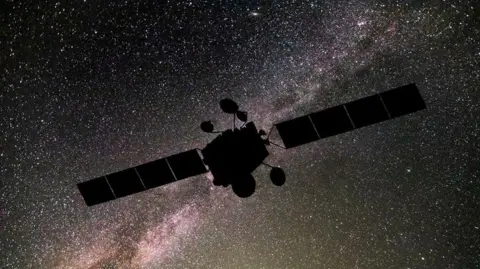Scientists seek to stop satellites colliding
 Getty
GettyA new space research centre will focus on how to prevent satellites crashing into each other.
Durham University's £5m project will bring scientists and policymakers together to design better "traffic management" for satellites, according to Prof James Osborn, founding director of the centre.
He said the assumption that objects do not crash into each other because space is so vast "could no longer be relied upon".
He also said satellites were vital to bring the internet to rural areas such as Weardale in Durham.
In the 1960s the world launched very few new satellites in space a year.
However, Prof Osborn said in recent years the number had skyrocketed due to the widespread availability of reusable rockets.
"Now it's thousands of satellites a year," he said.
Potential collisions
There are currently about 10,000 active satellites in orbit.
Prof Osborn said: "Nobody knows where they are going at any one moment.
"That's a problem because that leads to potential collisions or accidents.
"The new centre is helping to build technology to monitor where satellites are."
The space centre team is also working on new policies for managing objects in space in the hope they will be taken up by space agencies and governments.
Being able to devise new technologies as well as work on new policies in tandem was the "key point" of the centre, he added.
Follow BBC North East on X, Facebook, Nextdoor and Instagram. Send your story ideas to [email protected].
